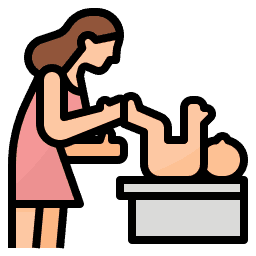Baby's Poop Smells Like Fish Updated
Baby's Poop Smells Like Fish
Did your petty one laissez passer their first bowel motion, and y'all're worried the color isn't normal? Did you know that baby poop comes in nearly all hues and textures?
Ane affair your parenting manuals may not have taught yous is that you'll spend the side by side few years existence overly concerned about your baby'due south poop. It can give you lot greater insight as to your infant's wellness.
We'll suspension downwards the different types of infant poop, explain what'southward normal, and what you should await out for.
Types of Baby Poop and What They Mean

In that location are five types of infant poop — newborn, breastfed, formula, solid, and partially digested.
Be aware that your baby'south bowel movements will depend a lot on their diet.
Let's have a closer look at the types:
1. Newborn Poop (Meconium)
During your baby's first days exterior the uterus, they pass a tar-like, green-black poop (1) . It'southward mucilaginous, and some describe information technology as having a motor oil appearance. Information technology can scare parents who aren't prepared for such a colour.
Newborn poop, or meconium, consists of everything your babe ingested while in utero. This includes amniotic fluid, skin cells, mucus, and other substances. Information technology doesn't have any traces of breastmilk or formula only all the same, as it's a starter for the intestinal tract. Almost infants pass a meconium stool within the first 24 hours of life.
Later the get-go two to four days, the meconium changes color and texture, meaning it'south now a transitional stool. Expect a lighter color (recall regular army dark-green), with a less sticky form. Once y'all see this poop, it ways your little one'due south intestinal tract is working, and he or she has begun to digest breast milk or formula.
Sometimes information technology happens that babies pass meconium before delivery. This is generally due to infections, gestational age over 40 weeks, or a tough delivery causing physiologic stress to the babe. It's easy to observe through the amniotic fluid, which turns light-green or brownish every bit opposed to being transparent (2) .
Passing meconium before birth can have dire effects on the babe, and extra care must exist taken following delivery. You may notice a neonatal squad in the commitment room, set and waiting to assess your baby after nascence. The baby is likely to ingest some of the stool, triggering something chosen meconium aspiration syndrome, which causes a lung condition that can plough deadly (three) .
On the other paw, some babies accept a blockage issue, hindering them from passing meconium even after birth. If your baby doesn't have its showtime bowel movement within 24 hours, your doctor volition look for issues. These tin can include an underdeveloped anus, intestinal blockages, or meconium plug (stuck stool).
2. Breastfed Poop
Good for you breastfed babe poop is xanthous, but tin sometimes appear slightly green. It should have a creamy, mushy consistency, and may be textured with seed-like flecks. Many draw it equally having a loose Dijon mustard mixed with cottage cheese look to it (sorry to Dijon or cottage cheese lovers!).
The consistency can vary. Sometimes, it'southward runny plenty for parents to confuse information technology with diarrhea (4) . Breastfed poop depends highly on what you ate and how much your baby is ingesting. Expect your baby to pass pocket-size "squirts" of these stools during feedings every bit well as more than voluminous ones between feedings.
Don't go spooked if the poop suddenly appears more than green than yellowish. If so, try to retrace what you had for dinner the solar day before. Every bit long as your infant isn't experiencing other symptoms such every bit fever or vomiting, you shouldn't worry.
3. Formula-Fed Poop
Formula-fed poop is different from breastfeeding poop. It'southward denser in texture and browner in color — it can be xanthous-brown, tan-brownish, or dark-green-brown. Many compare it to peanut butter.
Formula-fed babies likewise pass fewer bowel movements, sometimes only every two to 3 days, only they're significantly larger.
4. Solid-Fed Poop
Equally y'all begin to introduce some solid foods such as infant cereal, pureed fruits, or vegetables, the poop volition modify. Typically, this is at around four to 6 months — go along in mind that the solids are used as a complement to breastmilk or formula.
The consistency becomes thicker, and it develops into a browner or darker colour. It's especially noticeable if you lot've otherwise been exclusively breastfeeding.
5. Partially Digested Poop
Once your baby eats more solid food, such as boiled carrots or blueberries, yous'll probable notice some chunks in the diaper (5) . Your baby's diet profoundly influences the color. Their poop could be red from beets, blue from blueberries, or even green from spinach and peas.
Chunks are normal since your baby's tum is still getting the hang of metabolism. Some of the food may laissez passer so fast that there's only time for partial digestion. It'south not unusual to see fruit skins such equally those from blueberries or grapes.
Pieces are probably as well due to your baby's lack of teeth if you're starting solids early on. Your piffling 1 may swallow earlier chewing everything through properly, which is also completely normal.
Baby Poop Colors and What They Mean

Every bit nosotros mentioned, baby poop comes in all hues — it's piece of cake to get surprised past a sudden change.
It'due south crucial to know what different colors hateful as some could indicate a problem. Here'due south a breakdown of colors and what they imply:
1. Black

Although black seems like a ruby flag warning, it's normal during the commencement days following nativity. Meconium can vary in colors from dark light-green to blackness, which is why many compare it to motor oil.
Blackness poop, however, isn't normal or healthy if it continues for more than a few days. It shouldn't occur subsequently during infancy. If it does appear, the color could be due to diet from grape juice, licorice, or even Oreo cookies.
If your child hasn't had any black foods, they may have ingested cigarette ashes, perhaps even charcoal. It could also appear due to medicines like iron supplements or bismuth.
If none of the to a higher place utilise, black, tar-similar poop occurring afterwards three months could indicate bleeding in the breadbasket. It's a condition chosen melena, which causes bleeding in the digestive tract (6) .
You won't run into bright cerise claret in the stool. Instead, the acids in your baby's stomach turn the blood into a sticky, black substance, giving the stool a tar-like appearance. Contact your dr. if yous discover this.
2. Green

Green stools are not an immediate cause for business and are often influenced by diet. Information technology's easy to confuse dark green with black poop under poor lighting. If you're in doubt, smear some stool onto a white paper, and the green hue should bear witness.
If the stool is night green, it'south generally due to bile. Even so, light-green vegetables such as spinach tin can also create a similar tone.
Babies with diarrhea may pass green stools as well, due to the fast transit fourth dimension. Medicines are another common culprit of greenish poop, only yous can ever contact your pediatrician if you're concerned.
In clinical practice, I frequently meet green stools when infants accept an upper respiratory infection. Streaks of mucus tin can be noted inside the green stool. Since infants cannot blow their noses or expel nasal mucous whatsoever other way, they eat it and pass it in their stools. If in that location is blood along with the mucous, it is an entirely different problem and should be discussed with your pediatrician.
![]()
Editor's Notation:
Dr. Leah Alexander, Medico, FAAP
3. Ruby-red

Ruby-red is another color that may spook parents since we tend to chronicle information technology to blood. Fortunately, much like green, information technology's significantly impacted by your baby's diet.
Reddish foods such as beets, tomato plant skins or juices, and sweets similar Clot-O, can get noticeable in your baby's stool. It's been estimated that 90 percentage of the and then-called "bloody poop" is not generated by blood. Medicines such every bit Amoxicillin tin can also influence the color.
When I prescribe the antibody Cefdinir, I always warn parents to expect a modify in stool color. (vii)
![]()
Editor'southward Note:
Dr. Leah Alexander, MD, FAAP
When blood is the culprit, it's not necessarily from the baby. A mother'southward bleeding nipples from breastfeeding is a common cause of claret-traced stool.
Yet, sometimes it can be due to bleeding in the lower alimentary canal, which volition crave a visit to the doctor. Milk poly peptide allergy is the most common cause of intestinal bleeding in infants. Blood and mucous typically appear 2 to 3 weeks of age, and are often associated with excessive crying and discomfort. Poor weight gain occurs in severe cases. If you notice these symptoms, call your md. It may be necessary to switch to a hypoallergenic formula. For breastfed infants, some moms cull to withhold dairy from their diet in order to continue breastfeeding. Fortunately, near infants who initially have a milk poly peptide allergy outgrow it past their first altogether (8) .
four. Mustard Yellowish

Mustard yellow indicates the stop of the meconium phase when your baby begins to digest breastmilk or formula.
This color is well-nigh common in breastfed babies, as formula tends to make the stool browner in tone.
5. Bright Yellowish
Brilliant yellowish stool is some other standard color seen later on the meconium stage, generally in breastfed babies.
The color yellowish tin can also be a sign of diarrhea, especially if the poop is quite runny or leads to blowouts.
If your infant has diarrhea, contact your md for advice on how to avoid aridity (9) .
6. Orange

Orange poop is typically caused by pigment from foods. Information technology'southward non unusual after your baby had a meal consisting of pureed carrots.
This shouldn't be a cause for concern unless your little one is experiencing other symptoms like fever.
vii. Light-green Tan

This is a common colour seen in formula-fed babies and those eating solids.
It's not a typical color to spot if yous're exclusively breastfeeding, though it's still not a cause for concern if you practice.
Baby Poop Warning Signs

Non all textures and colors are normal. Your infant's stools serve every bit a clue for what's going on in the body (10) .
Here are some things you should look out for:
one. White Poop
White poop is non normal and could be a sign your infant'due south liver isn't producing plenty bile for digestion. It's a serious event and should ever exist addressed by your pediatrician.
Bile is what gives stools the natural chocolate-brown color. A lack of bile can be caused past a liver illness such equally hepatitis. Sometimes, in that location's an object like a gallstone or tumor blocking the bile ducts (xi) .
2. Grayish Poop
Grayish poop with a chalky consistency can too betoken a problem with your infant's bile production. This type of stool looks very similar to white stools.You should address this with your pediatrician immediately. In contrast, night gray stools tend to be nutrition related and are normal.
iii. Foamy Stool
A foamy or frothy stool is common in babies and is typically easy to fix. It'southward unremarkably caused by the lower fatty content of foremilk compared to hindmilk (12) .
It'due south essential to empathise the ii types of breast milk — foremilk and hindmilk. Foremilk is the showtime milk your baby gets when they brainstorm to nurse, and is high in protein. After a couple of minutes, your baby activates the hindmilk which has a even more poly peptide forth with more than fat and Vitamins A and E.
Because foremilk contains less fat, your baby may exist hungrier and feed more than oft if not latching on for a full x to fifteen minutes. You lot tin can correct this by nursing your baby on the terminal breast they nursed on before. If it continues, contact your pediatrician.
4. Stringy Poop
If there are stringy, slimy streaks that are greenish in colour present in your babe's stool, it's a sign of mucus. Excessive drooling tin can crusade this, and information technology generally peaks around the fourth dimension your little one gets teeth.
Nonetheless, it can as well be a clue that an infection is lurking. If it persists or there are other signs of illness, contact your doctor.
5. Hard Pebbles
If your baby is passing hard, round pebbles, information technology's a sure sign of constipation. The pebbles may vary in sizes and shapes, merely they're likely to be making your baby uncomfortable.
The most mutual cause of constipation is less frequent feeding, or reduced amount of breastmilk or formula intake. In other words, it is a fluid issue. My first recommendation is to breastfeed more oftentimes during the daytime, or to offer an actress ounce of formula at each feeding. For infants older than vi months, sips of water can be offered between chest or formula feedings.
A mutual assumption amid parents, however, is that the baby is "constipated" if he or she hasn't stooled for several days, then ultimately passes a large liquid stool. If the stool is loose or soft, the baby is not constipated.
You can expect to see some blood. The blood, nevertheless, is typically from the anus and not a deeper upshot (13) .
Constipation is common when you're beginning to introduce solid foods. If information technology continues, consult your pediatrician who may recommend water. Water is not safe prior to 6 months sometime; formula and breastmilk should exist the only fluids given. Because of the loftier sugar content, juice is not an platonic remedy. In fact, the American Academy of Pediatrics has issued an updated policy on juice and other beverages that infants and children eat (14) . It is ameliorate to offer more fruits such as prunes, peaches, plums, and mangoes than juice.
6. Red Bloody Stool
Cerise blood constitute in the stool can exist a sign of allergies to nutrient items such as milk products. It can, all the same, besides indicate a bacterial infection and should be addressed by your pediatrician (15) .
7. Runny Stool
During the commencement month, it'southward normal that the stool is a piddling runny. What's non normal is when it comes out green or vivid yellow. The color modify is a sign of diarrhea, and measures should be taken to end it.
If diarrhea remains untreated, it tin can quickly lead to aridity. Nosotros recommend contacting your pediatrician if you suspect diarrhea as it could indicate an infection or allergy.
Always Consult A Doctor
If you fright your baby is dehydrated, e'er inquire your doctor for handling options. Never give water to babies under half dozen months unless otherwise instructed. Doing so could hinder your babe'south body from arresting nutrients from breastmilk or formula (16) .
How Ofttimes Should Infant Poop?

How oftentimes your baby should poop depends on whether they're breastfed or formula-fed.
You should also keep in mind that not all babies are akin, and some will go more than frequently than others. If you're concerned, contact your pediatrician.
Breastfeeding Babies
Usually, babies who are exclusively breastfeeding follow a loose pattern of i poopy diaper for every twenty-four hours of their life. Their first twenty-four hour period, they'll take one bowel movement, the 2nd day, they'll have ii, and and then on.
This loose pattern generally ends by solar day v where your babe will poop more oftentimes. You may find a stinky surprise every time you open the diaper. That said, it's not uncommon for some infants to go a mean solar day or 2 without having a bowel motility (17) .
At around the 6-calendar week mark, your baby's bowel movements may slow down. Some babies may go a whole week without pooping. Don't worry though, it doesn't necessarily hateful they're constipated unless their stool is hard and dry out.
Salubrious, breastfed poop should be loose and unformed, sort of like pea soup. As long equally your babe'southward stool follows this texture, it means the residue of foremilk and hindmilk is merely correct.
Formula-Fed Babies
Formula-fed babies take a different pattern since the stool is pasty or firmer. Still, babies on a formula diet may accept a bowel movement ii to three times daily.
Your niggling one's pattern tin can vary during the get-go 1 to ii months. Information technology's not unusual for a baby to poop multiple times one day, and then get several days without a movement. It may alter weekly (eighteen) .
Instead of worrying as well much about how ofttimes, inspect the consistency of the poop. If it's dry and difficult, your baby may exist constipated, which causes fewer bowel movements. Like to breastfed babies, y'all'll see a profound change once you innovate solids, both in texture and olfactory property.
Why Isn't Infant Pooping?

It's not always a serious issue if your infant doesn't have a bowel movement every day.
Experts fifty-fifty suggest it'south entirely normal for a 2- to 3-month-old to go one calendar week without pooping (nineteen)
Breastfed babies tin can mostly go longer with no bowel movements than formula-fed babies, without there existence a more significant issue. The reason is that breast milk provides everything your baby needs. At that place'south piffling to no waste product to pass through.
Exclusively breastfed babies also have a lower chance of becoming constipated. Breastmilk works as a natural laxative, helping your baby laissez passer a bowel movement.
Constipation is generally the culprit when your baby isn't passing gas. This makes them feel uncomfortable and perchance irritable.
Causes of Constipation in Babies
The answer to this also depends on the age and diet of your baby. Small infants feel constipation due to their weak abdominal muscles. They're all the same developing postpartum and crave more strength to poop.
The reason formula tin make your little 1 prone to constipation is ofttimes due to its ingredients. Some pediatricians may recommend you lot give your babe small doses of prune or pear juice. Always consult your medico before y'all give your babe anything other than formula or breastmilk (20) .
In one case your infant begins solid foods, the chance of constipation increases. Your petty i suddenly has to digest something that's significantly firmer than milk.
The most common offending foods that I run across in practice are white rice cereal and bananas. I oft recommend brown rice cereal instead which has more than cobweb.
![]()
Editor's Note:
Dr. Leah Alexander, Dr., FAAP
Around 12 months of age, many start drinking cow's milk. This is an essential source of calcium and vitamin D for a growing baby. Unfortunately, it is constipating and tin can create a blockage. Toddlers don't demand to drink cow'south milk as frequently as they consumed formula or breastmilk as an infant. Three 8 oz bottles a day is sufficient at 12 months old, and can be reduced to two bottles per day by eighteen months former.
In addition to constipation, excessive cow's milk intake can cause iron-deficiency anemia. Too much milk irritates the lining of the intestines, causing pocket-size amounts of haemorrhage into the stool. If your toddler consumes more than the recommended amount of milk, discuss this with his or her doc. (21)
If you're transitioning your 1-year-quondam off formula or breastmilk, it's a adept idea to include lots of veggies and fruits. The fiber in these works as a natural laxative and will help your toddler poop.
If your babe is dehydrated, they as well have a bigger run a risk of getting constipated, especially one time they brainstorm having solid foods. It'due south usually like shooting fish in a barrel to set — here are some tricks:
- Belly massage: If your baby seems constipated, endeavour to massage their belly gently. The motion could assist relax some of the muscles, assisting the blockage in moving along.
- Warm bath : Submerging your fiddling one'southward belly into a warm, relaxing bath tin can be just what they need. This worked similar a charm for my baby when things weren't moving.
- Taking rectal temperature: It may audio odd, but some experts suggest it helps to stimulate the rectum. It as well allows you to check your infant'southward temperature, which could bespeak some other upshot if fever is present.
- Glycerin suppositories: These may be used occasionally for babies after checking with your physician (22) . Avert using other "infant" laxatives, mineral oils, or enemas to care for your baby's constipation without a doctor's supervision. This is specially so for babies under one year (23) .
Types of Babe Poop Smells

I thing many commencement-time parents wonder nearly is how bad baby poop smells.
A babe'south stool doesn't odor as bad every bit what we can produce, simply information technology does depend on their diet.
1. Newborn Babe Poop Smell
Meconium (newborn stool) doesn't have a singled-out smell. Some describe it as odorless where others say information technology has a sweet odor. The reason for this is that the poop is sterile — bacteria isn't present in the intestines at this bespeak.
The bacteria in our intestines is what gives stool that "lovely" odor. Leaner, however, is introduced to your baby'south breadbasket afterwards the first feeding. So, the odorless poop is brusque-lived.
ii. Breastfed Baby Poop Smell
Once bacteria is introduced through breastfeeding, your piffling i's poop takes on a new smell. While still in their infant stage, the stool shouldn't smell too bad. Many parents note it's sweet-smelling — describing it every bit hay, porridge, and fifty-fifty popcorn.
If your baby produces a more pungent stool while beingness exclusively breastfed, you can mention it to your pediatrician. However, it's more the color and texture yous should take note of. If it turns greenish or becomes too runny or dry out, it could bespeak an infection or allergy.
A diarrheal stool caused by Rotavirus can give a particularly foul scent to the stool. No blood is present, only the stools become watery, dark-green, and malodorous. Fortunately, there is a vaccine that prevents this infection in infants, administered during the 2, 4, and half dozen-month-erstwhile well visits. (24)
three. Formula-Fed Infant Poop Smell
As with the consistency, the formula-fed stool has a different odor, which can be unpleasant to some.
Formula is human-made, so it'due south not every bit easy for a baby's developing intestines to blot as breastmilk is. This leads to more waste in their stool, giving it that potent odor and thicker texture.
You should never compare a formula-fed stool with a breastfed one. You should keep an eye on the consistency and color. If it becomes thicker or thinner than peanut butter, your baby could either be constipated or have diarrhea.
4. Solid Foods and Baby Poop Aroma
Once you begin to incorporate solid foods into your baby's diet, you'll see a significant change in regards to smell, especially when meat and chicken is introduced. The stool will likely starting time to resemble adult poop, but it does depend on your infant'due south carte.
Babies' Poop Faces

Babies are cute, and the grimaces they do while pooping often make us laugh.
Did yous know your babe'southward poop face up could exist an indicator of a potential event? Here are a few dissimilar poop faces and what they mean:
1. Scrunched Up Face
This is a typical poop face associated with gas, especially if it's followed past crying. If your baby is scrunching their face, grunting, or otherwise giving you clues they're uncomfortable, they could exist constipated or just pushing against lots of intestinal gas.
To help your babe movement things along, you could try 1 of the remedies mentioned earlier. If your baby isn't struggling, as in no grunting or crying, it's probably just their regular poop confront.
2. Pouty Lips and Grumpy Face
A pouty lip and grumpy face mean your infant has had enough of whatever they were doing, even pooping. They may brand this face if they're struggling to pass gas. The look can quickly occur if you're changing nutrition or introducing solids and the stool is harder.
An first-class remedy for this is making cycling motions with their legs. Hold your little ane's feet up and then keep to circulate in a move like to bicycle crunches. If your babe still feels uneasy, try to distract them by walking effectually the room while property them or placing them in their swing.
If your babe continues to struggle, give your physician a phone call. They may recommend clip juice if your infant is one-time enough and if the prior few stools were difficult.
3. Happy and Relieved
A grin from your baby can warm your heart in a matter of seconds — until they reek of digested carrots and formula. A face showing happiness and relief could point your niggling 1 already did the act. You might not see this face while your infant is passing gas, but you'll notice information technology after.
A happy confront isn't usually an indicator of a struggle. Instead, it shows your little i passed the bowel movement without much try.
iv. Gazing
Gazing isn't necessarily an sectional poop face, simply it may take you by surprise. Babies tend to go hyper-focused on things, giving them a far-off, aimless look. Even so, they may still be working, and earlier y'all know it, the diaper is full.
A gazing face doesn't indicate a struggle with pooping. Sometimes, it may even happen that your footling i passed the bowel motility without fifty-fifty noticing.
The Poop Scoop

As we've seen, there are many types of baby poop.
Information technology changes from month to calendar month and varies between diets.
As a newborn, your infant will pass their beginning stool called meconium, a night green, almost black, sticky poop. Soon later on, their poop changes, taking on a more yellowish appearance depending on whether you're breastfeeding or giving formula.
Watch out for changes. Colors such as white or grey, and poop that's stringy, runny, or hard pebbles. These could all point a problem, and we advise that you lot contact your doctor should whatsoever occur.
If this all seems a bit unusual to you, don't worry. It won't exist long earlier checking out your baby's poop becomes 2d nature.
Baby's Poop Smells Like Fish
Posted by: danielhisered.blogspot.com

0 Response to "Baby's Poop Smells Like Fish Updated"
Post a Comment